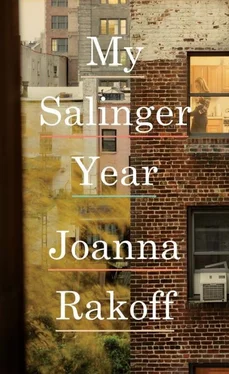I held my finger to my lips like a librarian. Shhhhh! And smiled. Other than the finance department, with its glaring fluorescents, the office was lit almost entirely by shaded lamps, which meant that its warren of rooms were indeed much more dim than a modern office, like Jenny’s, with walls of windows and bright overheads. But this was part of what I loved about it: the soft, consoling glow cast by the lamps; the hush of my co-workers’ feet on the soft carpet, the leather armchairs and dark wood bookcases. It was like working in someone’s apartment or a private library.
“Or a funeral home!” said Jenny as we walked across Forty-Ninth Street, back in the direction of her office. “Or a bar. I can’t believe your boss really smokes. At her desk!” Jenny had been, actually, the first of my friends to take up smoking, her junior year of high school, the side effect of dating a college guy. This shocked me at the time. “Isn’t it depressing, being in that office all day? Everyone looks so sad. It really does remind me of a funeral home. All those old-fashioned lamps. The rugs.”
“Maybe a little,” I conceded, though it didn’t at all. I loved the lamps and rugs, loved that the office was hushed and softly lit. “Do you want to come back to Williamsburg for dinner? We could go to Planet Thailand.” I had been contriving to get Jenny over to my neighborhood for dinner or coffee, to show her my apartment, my lovely block, hopeful that if she came for the afternoon, she’d fall in love and move there.
“I don’t think I can go all the way to Brooklyn,” she said. “It’ll take me forever to get on the ferry from there.”
“It’s not that far,” I began. This was true: I was just one stop in from Manhattan. Twenty minutes from where we stood. “But should we just get on the train and go downtown? We could go to the Grey Dog? Or John’s Pizzeria?” Jenny loved John’s.
She shifted uncomfortably on her Mary Janes. “Maybe we could just stop somewhere here? I should get on the ferry in an hour or so.”
“Here?” We were on the West Side now, at the edge of the theater district, surrounded by overpriced restaurants designed for conventioneers and tourists, steak houses with laminated menus, chain Italian joints, loud Irish pubs. No one I knew would ever willingly eat in any such establishment.
“There’s a place that my boss sometimes takes us to.” She spoke now in mollifying tones. “It has a terrible name, but the food is actually really good.”
“What’s it called?” I asked.
“Pasta Pasta!” she said, smiling. “Pasta Pasta Exclamation Point!”
Ensconced in a booth, spearing quills of penne, I felt silly: Jenny was right. There had been no need to go downtown. The food was beside the point. We talked about Texas, about the latest installment of Jenny’s wedding saga—her parents had deemed the boathouse too expensive—about Don’s novel, which was still not done.
“How is Brett?” I finally asked. “Has he heard from all the schools?” His acceptance letters—and rejection letters—from law schools had started arriving back in March. I knew he’d been accepted to two in New York: Brooklyn Law and Cardozo. And he’d been wait-listed at a few places.
Jenny nodded. “He has. He got into Case Western off the wait list, and he’s decided to go.”
“Case Western?” I asked, my stomach dropping. “Why? He got into Cardozo.”
“Well, he just thinks Case Western is the right place for him. It’s a really good school. And, you know, he’s from the Midwest. He misses that area. He thinks law school in Cleveland will be a little bit less intense . Law students in New York have got to be crazy competitive.”
I nodded. “And you’ll stay here until he’s done?”
She laughed. “No, I’ll go with him.” She rolled her eyes. “We’re engaged .”
“Oh, right! I’d forgotten.” I took a bite of my cooling pasta. Pasta! I thought. Exclamation point! Did I have friends other than Jenny who would find that funny?
“I’m actually kind of excited about it. I’ve never lived anywhere other than New York. Cleveland is a cool city. The art museum is great. And it will be so cheap. We can get, like, a huge house for less than we’re paying for our apartment.”
I had gone to Oberlin. I knew all about Cleveland, but I just nodded, sipping the dregs of my house red. Jenny had not ordered wine, which made me feel like a lush. Everyone else I knew ordered wine with dinner by rote. What was the point of going to dinner—even at a cheesy, awful corporate restaurant in midtown—if you didn’t order wine? For a few minutes, we sat in silence, then Jenny smiled goofily—her old smile, which I saw so rarely now—and said, “I think we should split the tiramisu. It’s completely terrible. But also completely amazing.”
“Sure,” I said, as she signaled for the waiter.
“So what happened with Judy Blume?” she asked. A week or so ago, I’d told her that Judy was coming into the office. The old Jenny would have loved this turn of events, would have wanted to know everything. The new Jenny had waited until after dinner to ask about it. And though I wasn’t sure that she even cared, I explained what had transpired.
“Of course she left!” Jenny cried.
“Because my boss maybe told her that she wasn’t sure she could sell her new novel? And keeps her books in the least visible part of the office?” I smiled at her. “Or because the office looks like a funeral home?”
“All of that, obviously,” she said, swirling a bit of cake in marsala. “But really because the Agency is like something out of Dickens. You step inside, and it’s like you’ve time traveled back a hundred years.” She gave me a funny look. “We were walking through the office and I was trying to figure out why it seemed so weird . And then, when we got to your desk, I realized, There are no computers! ”
“I told you I typed everything. On a typewriter.”
“I know,” she said, shaking her head, dark waves bouncing glossily on her shoulders. “But I figured that was just some quirk of your boss. That she was old. I didn’t realize there were no computers at all . It’s 1996. How do they do any business? Everyone uses e-mail. How do they even communicate with the world?” She paused, cocking her head to the side. “If I were Judy Blume, I’m not sure that I would put my career in the hands of an agency that refuses to admit it’s almost the twenty-first century.”
Back in March, James had found the wherewithal to approach my boss about entering the digital age, if in the most minor, tentative manner possible. Not an office full of computers. No network. Just a few desktops, for the assistants, so that we might do our work more efficiently. Maybe without Internet connections even.
“Give me something in writing,” my boss finally conceded, in April. “Price it out.”
By the end of the day, he was back, rapping firmly on her office door. “Just wanted to give you this,” he said, handing over a neatly typed sheaf of papers.
It was June, the week after the Judy incident, before she sent me to fetch him. “Come in, come in,” she said as we approached. “Not you”—she tilted her head toward me—“just James.” And she shut the door.
Half an hour later they emerged, chatting chummily. “Do they come in black?” my boss asked.
“It’s possible,” said James, nodding.
“All the computers I’ve seen are that awful putty color,” she complained. “Yech. Why do they make them that color?”
“I’ll see about black.”
“Mind you, I’m not saying yes.” My boss paused in front of my desk. “But you have intrigued me. It could help with Salinger.”
Читать дальше












